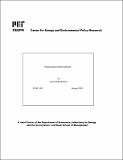| dc.contributor.author | Montero, Juan-Pablo | en_US |
| dc.contributor.other | Massachusetts Institute of Technology. Center for Energy and Environmental Policy Research. | en_US |
| dc.date.accessioned | 2009-04-03T17:04:56Z | |
| dc.date.available | 2009-04-03T17:04:56Z | |
| dc.date.issued | 2002 | en_US |
| dc.identifier | 2002-001 | en_US |
| dc.identifier.uri | http://hdl.handle.net/1721.1/44982 | |
| dc.description.abstract | I study the design of environmental policies for a regulator that has incomplete information on firms' emissions and costs of production and abatement (e.g., air pollution in cities with numerous small polluting sources). Because of incomplete information on emissions, there is no policy that can implement the first-best. Since the regulator can observe firms' abatement technologies, however, it is possible to design a quasi-emissions trading program based on this information and show that it can provide higher welfare than command-and-control regulation such as technology or emission standards. I then empirically examine this claim using evidence from a particulate quasi-emissions trading program in Santiago, Chile. | en_US |
| dc.description.sponsorship | Supported by the MIT Center for Energy and Environmental Policy Research. | en_US |
| dc.format.extent | 40 p | en_US |
| dc.publisher | MIT Center for Energy and Environmental Policy Research | en_US |
| dc.relation.ispartofseries | MIT-CEEPR (Series) ; 02-001WP. | en_US |
| dc.title | Trading quasi-emission permits | en_US |
| dc.type | Working Paper | en_US |
| dc.identifier.oclc | 52304584 | en_US |
